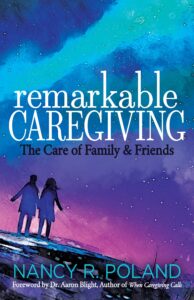Six Remarkable Caregivers

Stories of Six Remarkable Caregivers

Remarkable Caregivers? Not one of these six people planned on taking a chunk of their lives to focus on caring for the extreme needs of another person. Whether it be the surprise of a baby born with challenges, including Vater syndrome or Down syndrome, or the unexpected court date where a daughter had to give up guardianship of her mom, not one of these six could predict the resilience and ingenuity they would find within themselves.
In Remarkable Caregiving: The Care of Family and Friends you will find surprises, like these:
- Why Cynthia had to kidnap her mom in a harrowing airplane ride.
- Carol, an extraordinary mom, who gave a humorous answer to the question, “Why does your son Buddy have a string in his nose?”
- How Sandra and Ken used the two Ws to keep Sandra’s Dad going into his 90s: Walking and Water. Over and over.
- Speaking of walking, how Phil “walked the walk and talked the talk” while serving as the “relief pitcher” for his good friend Wally who had Parkinson’s disease.
- Jean got the bad news at work: her mom’s accident left her with six brain contusions, a ruptured spleen, and six broken ribs. Jean did everything from cleaning the hospital rooms to sneaking in phone calls at work to the doctors.
- Diana and Greg struggled over what to do with their adult son with Down syndrome. They were the first ones in their home state to find this new – and workable – solution.
Here are six reasons I am excited about Remarkable Caregiving:
- Features stories of six ordinary people thrust into the role of caregiving.
- Demonstrates stories of caregiver resilience and ingenuity.
- A teaching tool for groups to learn why it pays to be prepared for future caregiving situations.
- For caregivers who feel alone and frightened, there is hope.
- Help and advice for caregivers experiencing stress and loss.
- With all the bad news in the world, Remarkable Caregiving celebrates people who truly live out their values.
Public release of Remarkable Caregiving – November 2nd, 2021. You can order Remarkable Caregiving on Amazon and other websites that sell books, or from https://nancyrpoland.com.
You won’t want to miss out on these inspiring stories!
Nancy Poland



